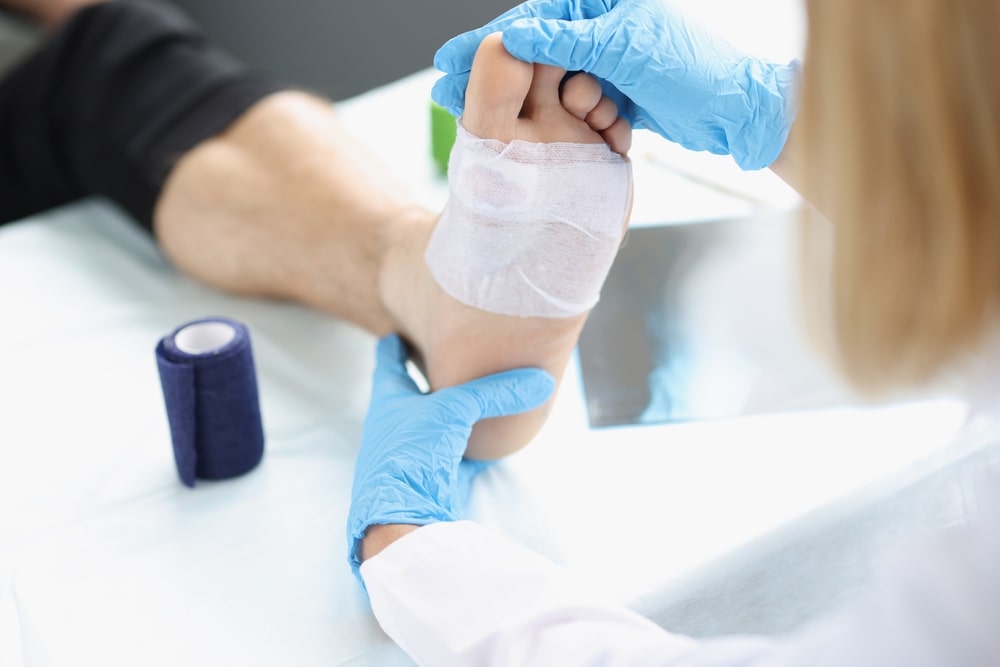
If you have diabetes, you’ve probably been warned that the condition makes you susceptible to slow-healing wounds. While it isn’t inevitable that you’ll have healing problems due to your condition, diabetes does make it harder for your body to fight off infections and rebuild damaged tissue, especially when it is poorly controlled. Understanding why this happens can help you learn how to prevent unnecessary damage.
In diabetes, your body either doesn’t make enough insulin (Type 1) or can’t use the insulin it makes effectively (Type 2, by far the most common form). Insulin is a hormone that moves blood sugar (glucose) into the cells to be used as energy. When this process is impaired, the level of sugar in your blood rises. Elevated blood sugar levels affect the nerves, circulation, and immune system in ways that impede normal healing and can lead to serious complications if not addressed.
Consistently high blood sugar can, over time, damage the nerves, leading to tingling, pain, and/or numbness. Known as diabetic neuropathy, this condition is common—affecting an estimated 60% of patients—and most often affects the hands and feet. It can become a significant problem because a loss of feeling, particularly in the feet, may make it hard for patients to realize when they have a scrape, blister, ingrown toenail, or callus. That minor injury can then become infected and develop into a more serious wound.
Diabetes negatively affects circulation in several ways. High blood sugar changes the consistency of the blood, making it thicker. This happens because when blood sugar is elevated, your kidneys will work harder to try to filter the sugar out of your blood, taking fluids from your body in the process. (This also causes excessive thirst and urination that are associated with diabetes.) The increased thickness of the blood makes it harder for your heart to push it to all the tiny capillaries in your extremities. At the same time, diabetes increases plaque buildup in the blood vessels, particularly those in the limbs. This can lead to peripheral artery disease (PAD), a condition in which blood flow is reduced to the arms and legs due to the plaque buildup in the blood vessels.
High blood sugar also changes the chemistry of your blood in ways that make your immune system less effective. Extra sugars break down into dicarbonyls, compounds that make it harder to fight off infection. When blood sugar is high, glycation (when sugars attach to proteins without the help of an enzyme) is also elevated, which further reduces immunity. Finally, high blood sugar can strengthen the bacteria causing an infection, making it more difficult to eradicate.
The combination of reduced blood flow and a weakened immune system are what make diabetic wounds so slow to heal. First, it’s more difficult for the body to get white blood cells, other immune cells, and healing factors to the site of the wound. Once there, their impaired effectiveness makes it harder for them to make headway against any infection. The longer the wound remains open, the more likely it is for additional infections to take hold, and lack of sensation at the site increases the odds a patient won’t immediately notice that the wound is getting worse instead of better.

All of this means that expert care is essential for healing diabetic wounds, especially if redness, swelling, or any discharge (all signs of infection) are present. You should certainly seek care if your wound has failed to heal with self-care measures within a month. If you’re not sure your injury is serious enough to treat—come in! Without proper treatment, a seemingly minor wound can develop into a diabetic foot ulcer and even lead to gangrene or osteomyelitis (bone infection). The expert team at Corona Foot & Ankle can provide the care you need to avoid serious complications and heal your troublesome diabetic wounds.
We pair advanced wound care techniques with a holistic approach designed to prevent the recurrence of wounds so our patients can live healthy, active lives free of pain. We design treatment plans that include regular checkups, lifestyle guidance, and education on at-home foot care to let our patients achieve and maintain wellness. To find out more about Corona Foot & Ankle’s wound care practice or to schedule an appointment, contact us here.
Have any questions about treatment? Feel free to make an appointment, Our team will reach you soon!
Contact Us